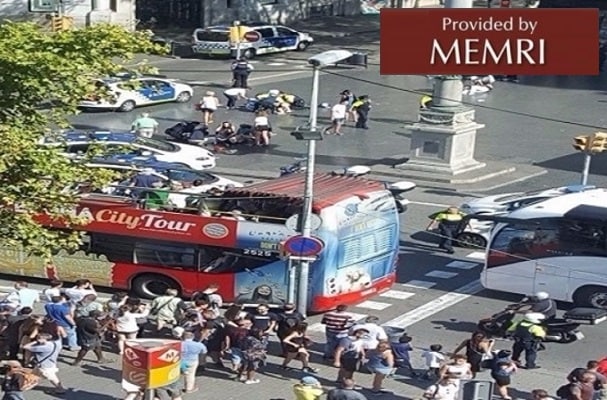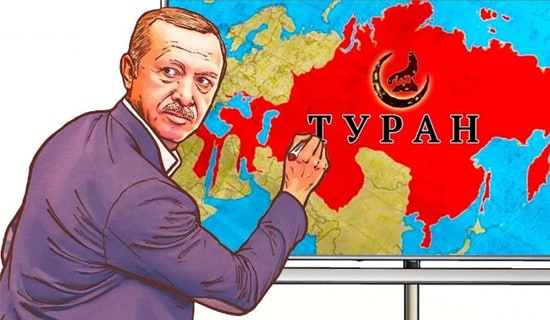In response to the August 17, 2017 vehicular attack in Barcelona, that was carried out by an Islamic State (ISIS) cell whose members are Muslims of Moroccan origin, several articles in the Arab media called on the Arab world to prioritize the fight against extremism, to stop justifying terror attacks, and to take steps to end the teaching of hatred in Arab societies. In a strongly worded column, Ghassan Charbel, editor of the London-based Saudi daily Al-Sharq Al-Awsat, argues that the framing of the attacks as a response to Western wrongs against Arab countries and Islam is aimed at concealing the desire to kill, and that the Arab world still clings to the past instead of embracing the future. Charbel calls for a rational examination of the factors that bring about a culture of hatred of the world that produces murderers.
Additionally, senior columnist for the Jordanian Al-Ghad daily Fahed Al-Khitan writes that the terrorist attacks fan the flames of hatred in the West toward the Arab world and Islam, and calls on the Arab world to strongly oppose terrorism and to reject the fatwas that the terrorists use to justify their actions.
The following are excerpts from the columns by Ghassan Charbel and Fahed Al-Khitan:

Scene of the August 17, 2017 Barcelona terror attack that killed 13 people and injured at least 130 (Image: almasdar.tn)
Al-Sharq Al-Awsat Editor Ghassan Charbel: Why Are We Tempted To Clash With The World, Instead Of Living With It And Within It?
"Every time an explosion is heard in any city in the world, the same scene plays itself out. I go into the newsroom, see the eyes glued to the breaking news appearing on the screens, and hear my colleagues mumbling, 'Just don't let the perpetrator be an Arab;' 'Just don't let the perpetrator be a Muslim;' 'We don't need any more [incidents].' I hear them and I share their sentiments. But very quickly the truth stares us in the face. It's no secret that attacking the world has become our exclusive, terrible specialty.
"I know full well that the man who ran over the tourists in one place or another does not represent his country of origin or the sect to which he belongs, that he did not receive official authorization to perpetrate the crime, that he was a wanted man in his country before he was added to the international lists of wanted criminals, and that he poses a greater threat to his country of birth than to the faraway arena where he committed the crime.
"I know that fanaticism is not the monopoly of a particular region, or sect, or country... but we must acknowledge unequivocally that we are the masters of aggression directed at the world and that we have attained a ranking that cannot be surpassed in the Guinness Book of World Records...
"The sight of the tourists bleeding to death as the result of an action carried out by someone from our world makes me very ashamed. Why should I feel obliged to apologize to the family of a man from China, who happened to be in Barcelona, or to a Japanese tourist who decided to holiday in Nice, or to a German who visited Luxor?
"It is shocking. Who gave us the right to attack countries and cities? Who gave us the right to murder young people who are celebrating life in Istanbul? Who gave us the right to murder the people in the Twin Towers in New York? The use of the argument about the oppression we suffer in one place or another as justification is just a cover-up intended to hide a deep lust to kill the different other, and a deep desire to wipe out anyone whose characteristics or beliefs are not consistent with our own. Even if we assume that we are being wronged, should we respond to that by causing even worse harm to innocent people? The claim that the world hates us is not true. It cannot be denied that at times the West has done certain bad things in response to our bad deeds, but it certainly doesn't reach the level of the killing sprees that we organize in various and distant places. Whoever is familiar with the West knows that the law there is sovereign and takes precedence over all, and that it protects even those who preach hatred. Many people know that the Arab and Muslim communities in Europe enjoy a freedom that they are often denied in their countries of origin.
"Why do we attack the world? Is it because it chose to advance toward the future, while we hold fast to the past? Is it because it invented the airplane in which we fly, and the cars in which we drive, and the cure for cancer that we use in our hospitals? What is the reason for this hatred toward the West, where we long to see our children and grandchildren graduating from university?
"Why do we attack the world? Is it because we have failed at building modern countries, at developing them, at creating employment, at ensuring [personal] freedoms and establishing the rule of law? Do we see the progress of the other as our defeat and a threat to our existence? Is the solution to explode there [in the West], or to exit the tunnels that we have been happy to dwell in for so long? Is it right that we are terrified by the range of colors, the opportunities and the possibilities, and that we are anxious about [the destiny of] a drab world that in our delusion we believe is the guarantee of our survival and the perpetuation of our identity, far from any [outside] influence...? Or is it true that we are panic-stricken every time we hear the ringing of the bells of the [modern] era? The bells of the era of science, of technology, of medicine, of ideas, of culture, of education, and of music.
"Why do we attack the world? From where did we bring this immense weight of hatred? Why are we tempted to clash in such a horrible way with the [rest of the] world, instead of living with it and within it? Why do we prefer explosion to dialogue? Death to mutual influence and compromise? The ruins to living in shared houses? Dust to pluralism, and turning our back to extending our hand? And the title of 'murderer' or 'deceased' to dialogue and mutual recognition of the other?
"We will not be able to continue to attack the world. This policy will bring about the destruction of our societies before it leads to the destruction of a single coffee shop, museum, or tower, in the world of the other. The murderers who wander [the world] are killing their countries of origin, while they delude themselves that they are killing the other. These countries [in the West] who appear fragile, are capable of living alongside the danger, since they are countries and institutions that make mistakes and correct them, that examine [their perceptions] afresh and supply alternatives.
"The time has come to make the war against the extremists our top priority. The dictionary of extremism at home, in the neighborhood, in the school, and in the various curriculums must be closed. The broadcasts of hatred on television and on social media must be stopped. We must ask ourselves what is this culture that creates the inclination to attack the world? In the absence of brave, rational confrontation we will sink ever deeper into the slime and blood and give life to more and more wandering murderers."[1]
Al-Ghad Senior Columnist Fahed Al-Khitan: We Still Hesitate to Repudiate Terror – And We Must Prove To The World That We Do
"Thousands of people across the world have been harmed by the crimes [of ISIS]. Some have been killed or wounded; others lost a relative or a friend. Like them, hundreds of thousands of people who live in the cities [of the world] have had this bitter experience, and have seen their cities hurt and bleeding. These people will never forgive or absolve [ISIS for this]. It is they who are likely to consolidate our [Arab] image in the eyes of the world. We may not be aware of the damage in the short term, but in the near future we will witness changes in the thinking of a broad sector of Western public opinion.
"The buds of the hatred [of Arabs] have emerged in force [in the West], in the form of the rise of the radical right in all Europe's elections, in xenophobia – particularly with regard to Arabs and Muslims – and in ostracism of the refugees. The liberals and those on the left in the West are fighting these phenomena, but with every additional terror attack, their voices grow fainter, and signs of their despair and frustration show [more clearly].
"Our prevailing narrative, [that is, that these terrorists constitute] an unrepresentative minority, will not hold water for long. We will have to prove to the world that a majority among us repudiates terror. So far, we are still hesitating. Following every sentence of careful condemnation from our side, there comes a 'but.' Many among us are still searching for an excuse for the murderers and justification for their crimes. We still hold sacred the fatwas from which the terrorists draw [sanction for their actions]. We no longer have room for maneuvering or evasion.
"We must take a firm decision – for if we do not, it will be unreasonable to ask why they hate us. The well of our own hatred is more than enough for us to become a nation rejected by the entire world."[2]





